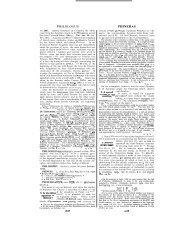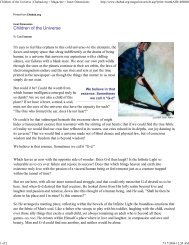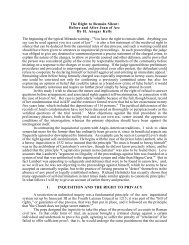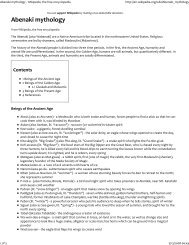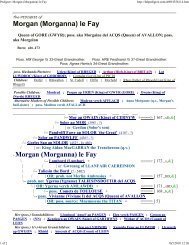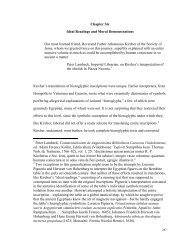sefi;g:v. - A Kabbalist walks into a bar, and the
sefi;g:v. - A Kabbalist walks into a bar, and the
sefi;g:v. - A Kabbalist walks into a bar, and the
Create successful ePaper yourself
Turn your PDF publications into a flip-book with our unique Google optimized e-Paper software.
SELEUCIDB SELEUCIDE<br />
phaena, <strong>the</strong> wife of Grypus, <strong>the</strong> unfortunate Cleopatra<br />
was put to death (Justin, 393). Soon <strong>the</strong> scale was<br />
turned, <strong>and</strong> Grypus was defeated, <strong>and</strong> compelled to<br />
retire to Aspendus (Eus. Chron. 1257) ; Tryphaena was<br />
put to death in her turn by <strong>the</strong> victor. In 111 B.C.<br />
Grypus returned <strong>and</strong> won back nor<strong>the</strong>rn Syria. The<br />
result of <strong>the</strong> struggle was that <strong>the</strong> Syrian empire, now<br />
sadly shrunken in size, was partitioned between <strong>the</strong> con-<br />
testants, Grypus retaining nor<strong>the</strong>rn Syria with Cilicia,<br />
<strong>and</strong> Cyzicenus taking Phcenicia <strong>and</strong> Ccelesyria with its<br />
capital Damascus. Apparently a state of peace did not<br />
long continue; but <strong>the</strong> details of <strong>the</strong> never-ceasing<br />
warfare are hard to trace.<br />
It is clear that <strong>the</strong> bro<strong>the</strong>rs' war in Syria was intimately con-<br />
nected with a similar strife in Egypt, where also Ptolemy<br />
Alex<strong>and</strong>er <strong>and</strong> Ptolemy Soter 11. were at enmity, due to <strong>the</strong><br />
intrigues of <strong>the</strong>ir mo<strong>the</strong>r <strong>the</strong> reigning queen Cleopatra 111. (cp<br />
Journ. of Hell. Stud. 9 230 ; ustin, 39 4 ; Jos. Ant. xiii. 10 2 ;<br />
<strong>and</strong> see Mahaffy, Empire ol<strong>the</strong>' Ptokrnies, 409~3. .Grypus<br />
held with <strong>the</strong> party of Alex<strong>and</strong>er, <strong>and</strong> by way of attaching him<br />
more closely <strong>the</strong>reto Cleopatra sent him ar his wife her youngest<br />
daughter, Selene, beforetime <strong>the</strong> wife of <strong>the</strong> exiled Ptolemy<br />
Soter 11.<br />
The confusion in Syria was an opportunity for sur-<br />
rounding powers. In 103 B.C. even Rome, by <strong>the</strong><br />
victory of <strong>the</strong> Praetor M. Antonius over <strong>the</strong> pirates,<br />
gained a footing in Cilicia (cp Justin, 395). By <strong>the</strong><br />
union of Laodice (Thea Philadelphus), daughter of<br />
Grypus, with Mithridates I. Callinicus, <strong>the</strong> dynasty of<br />
Commagene was founded, <strong>and</strong> <strong>the</strong> way prepared for <strong>the</strong><br />
severance of that kingdom from Syria (cp Mommsen in<br />
A<strong>the</strong>n. Miz't. 127f:). The Jews also, under John<br />
Hyrcanus, who had practically thrown off <strong>the</strong>ir allegi-<br />
ance since <strong>the</strong> death of Antiochus VII. (129 B.c.),<br />
made great strides forward, investing <strong>and</strong> destroying<br />
Samaria (about 108 B.C.) in spite of all that Antiochus<br />
Cyzicenus. even with <strong>the</strong> help of 6000 troops sent by<br />
Ptolemy Soter II., could do to save it (Jos. Ant.<br />
xiii. lozf.). Such successes as <strong>the</strong> Syrian king won<br />
were entirely neutralised <strong>and</strong> torn from his grasp by <strong>the</strong><br />
senatus consulturn secured by Hyrcanus bidding ' Anti-<br />
ochus <strong>the</strong> son of Antiochus' (Jos. Ant. xiv. 1022; cp<br />
id. xiii. 9 2 ) restore all his Palestinian conquests.<br />
In 96 B.C. Antiochus Grypus died, or was murdered by Her-<br />
acleon (Jos. Ant. xiii. 134 ; cp Eus. Ckron. 1259). He was<br />
forty-five years old at <strong>the</strong> time of his death, <strong>and</strong> left behind him<br />
five sons.<br />
Seleucus VI., Epiphanes, <strong>the</strong> eldest son of Antiochus<br />
Jos. Ant. xiii. 134 seems not quite accurate). A sketch<br />
of <strong>the</strong> character of Antiochus Cyzicenus is given in Diod.<br />
3534. We are told that he had to wife Selene, <strong>the</strong><br />
Egyptian princess, who had been married to his rival<br />
Grypus ; but whe<strong>the</strong>r her marriage to Cyzicenus occurred<br />
before or after <strong>the</strong> death of Grypus is unknown. For a<br />
few months Seleucus VI. was master of <strong>the</strong> whole extent<br />
of <strong>the</strong> Syrian empire, as it <strong>the</strong>n existed, but soon he was<br />
expelled by a rival, Antiochus X. Eusebes, Philopator,<br />
<strong>the</strong> son of .4ntiochus Cyzicenus. He was compelled to<br />
retire <strong>into</strong> Cilicia, where he took refuge in <strong>the</strong> town of<br />
Mopsuestia (mod. Missis).<br />
By his violent <strong>and</strong> tyrannical behavionr, <strong>and</strong> his extortions,<br />
Seleucus raised <strong>the</strong> inhabitants against him; <strong>the</strong>y fired <strong>the</strong><br />
gymnasium in which he had taken shelter, <strong>and</strong> he ei<strong>the</strong>r perished<br />
in <strong>the</strong> flames or slew himself to avoid a worse fate (Jos. Ani.<br />
xiii. 134. Aipian Syr. 69). This was probably in 94 B.C.<br />
Mopsue& was tdereafter razed to <strong>the</strong> ground by Philippus <strong>and</strong><br />
Antiochus XI., bro<strong>the</strong>rs of Seleucus.<br />
a Syria now presented <strong>the</strong> spectacle of; firstly, a<br />
contest between two branches of <strong>the</strong> Seleucids, <strong>the</strong><br />
al. antiochus descendants of <strong>the</strong> bro<strong>the</strong>rs Demetrius<br />
x. (94-83 B.C.). 11. <strong>and</strong> Antiochus VII., but both<br />
having <strong>the</strong> same ancestress [Cleo-<br />
patra Thea], <strong>and</strong>, secondly, of squabbles between <strong>the</strong><br />
members of <strong>the</strong> first branch, <strong>the</strong> five sons of Grypus '<br />
4359<br />
(Holm, Gr&. Hist. 4542). The confusion prevailing is<br />
well illustrated by <strong>the</strong> fact that Antiochus X. married<br />
Selene who had first been <strong>the</strong> wife of Grypus <strong>and</strong> had<br />
<strong>the</strong>n married Antiochus Cyzicenus, his own fa<strong>the</strong>r.<br />
First, Antiochus X. had to meet <strong>the</strong> opposition of<br />
Antiochus XI. <strong>and</strong> Philippus I., <strong>the</strong> third <strong>and</strong> <strong>the</strong><br />
second sons of Grypus. After a battle on <strong>the</strong> Orontes, in<br />
which Antiochus X. was victorious, Antiochus XI. lost<br />
his life in <strong>the</strong> river in his flight (Jos. Z.C. ; Eus. Chon.<br />
1261). Philippus <strong>the</strong>n assumed <strong>the</strong> royal title, <strong>and</strong><br />
held part of Syria (from 94 B.C.). In <strong>the</strong> meantime,<br />
Ptolemy Lathyrus had sent for Demetrius, fourth son<br />
of Grypus, from Cnidus, <strong>and</strong> had established him as<br />
king in Damascus.2 After hard fighting Antiochus X.<br />
was expelled from Syria (or, according to Josephiis,<br />
lost his life in battle with <strong>the</strong> Parthians).<br />
According to Appian (Miihr. '05) this Antiochus was alive<br />
<strong>and</strong> ruling in 83 B.C. when Tigranes (see below, S 22, end) made<br />
himself master of Syria. If this is true, his death in war with<br />
<strong>the</strong> Parthians fell later (it had already occurred in 75 R.c.).<br />
Ap ian (Syr. 69) also tells us that he married Selene, his fa<strong>the</strong>r's<br />
wi80w. His son was Antiochus XIII. ($3 23 ; cp Kuhn, Beitr.<br />
e: Gesch. der Seleukiden, 33~3.<br />
In what way Philippus <strong>and</strong> Demetrius divided <strong>the</strong><br />
kingdom is not known : but Demetrius orobablv ruled<br />
22: philippus C,!,syria <strong>and</strong> Antioch: Soon hostilities<br />
broke out between <strong>the</strong>m. Deme-<br />
I. <strong>and</strong><br />
trius was also engaged with <strong>the</strong> Jews,<br />
trius III. who in 88 B.C. called him in to aid<br />
<strong>the</strong>m against <strong>the</strong>ir tyrant prince Alex<strong>and</strong>er Jannzeus.<br />
Demetrius defeated Jannzeus (Jos. Ant. xiii. 14 13);<br />
but in <strong>the</strong> moment of victory Jewish national feeling<br />
awoke, <strong>and</strong> 6000 Jews went over to Alex<strong>and</strong>er from <strong>the</strong><br />
army of Demetrius. The Syrian king must have shown<br />
signs of desiring to reduce Judzea once more to a dependency<br />
of Syria. Demetrius <strong>the</strong>n turned his arms<br />
against his bro<strong>the</strong>r Philippus, whom he besieged in<br />
Bercea.s Straton, <strong>the</strong> ruler of Berea, who supported<br />
Philippus, appealed for assistance to <strong>the</strong> Arab sheik<br />
Azizus <strong>and</strong> <strong>the</strong> Parthian Mithridates. By <strong>the</strong>m Demetrius<br />
was himself beleaguered in his camp, <strong>and</strong> compelled<br />
to capitulate. He died in honourable confinement<br />
at <strong>the</strong> court of <strong>the</strong> Parthian king Mithridates 11.<br />
(Jos. Ant. xiii. 143).<br />
After <strong>the</strong> capture of Demetrins by <strong>the</strong> Parthians,<br />
Philippus made himself master of Antioch, <strong>and</strong> for a<br />
short time was sole ruler of what was left of <strong>the</strong> Syrian<br />
Grypus, .. on his fa<strong>the</strong>r's death laid claim to <strong>the</strong> uuempire<br />
(88 B.c.). The intestine strife was soon re-<br />
20. Seleucue divided empire, <strong>and</strong> proceeded to<br />
Epiphanes assert his claims by arms. Antiochus<br />
newed, for Antiochus XII. Dionyso~,~ <strong>the</strong> youngest of<br />
Cyzicenus marched <strong>into</strong> nor<strong>the</strong>rn Syria<br />
<strong>the</strong> sons of Grypus, claimed <strong>the</strong> throne, <strong>and</strong> established<br />
Nicator<br />
himself in Damascus (87/6 B. c. ). Philippus. indeed,<br />
against him, but being defeated killed<br />
(96-96 B*C')'<br />
himself in <strong>the</strong> battle (Appian, Syr.<br />
shortly afterwards took <strong>the</strong> town by <strong>the</strong> treachery of <strong>the</strong><br />
69 ;<br />
governor Milesius, while Antiochus was engaged with<br />
<strong>the</strong> Nabatzeans; but he was compelled to evacuate it<br />
again. When Antiochus resumed operations against<br />
<strong>the</strong> Arabians, <strong>the</strong> Jewish despot, Alex<strong>and</strong>er Jannzeus,<br />
attempted to <strong>bar</strong> <strong>the</strong> road through Judzea by constructing<br />
a great wall <strong>and</strong> trench from Joppa to Capharsaba,<br />
but in vain (Jos. Ant. xiii.151). Ten thous<strong>and</strong> Arab<br />
riders surprised <strong>the</strong> forces of <strong>the</strong> Syriaii king, who, true<br />
to <strong>the</strong> traditions of his house, fell fighting bravely<br />
(probably about 84 B. C. ).<br />
The end of Philippus is doubtful. In 83 B.C. <strong>the</strong> Armenian<br />
king Tigranes was invited to put an end to <strong>the</strong> long strife by<br />
making himself master of <strong>the</strong> Syrian kingdom. Nei<strong>the</strong>r<br />
Philippus nor Antiochus X. (if <strong>the</strong>y were still alive; see above,<br />
21) could offer any real opposition, <strong>and</strong> Tigranes made himself<br />
master of <strong>the</strong> entire Syrian kingdom from <strong>the</strong> sea to <strong>the</strong><br />
Euphrates, including also Cilicia (Justin, 40 I, Appian, Sy.<br />
He so ruled for fourteen years, Syria being governed by a<br />
:%ray. In 6 B c. <strong>the</strong> connection of Tigranes with his fa<strong>the</strong>rin-law<br />
Mithri&s of Pontus led to his own defeat by Lucullus.<br />
1 Ptolerny Lathyrus= Ptolemy Soter 11. (see PTOLEMY).<br />
2 Demetrius III., Eucgrus (95-88 B.c.). E~K~L~os, so<br />
Ant. xiii. 13 4, where, however, Niese reads 'AK~' os kl<br />
coins of Antiochus X. bear <strong>the</strong> tri le title Theos $hilopator<br />
Soter. or else Philometor Euerzetes - 8allinicw.<br />
3 A town E. of Antioch.<br />
4 Dionysos' coins bear also <strong>the</strong> titles Epiphanes Philopator<br />
Callinicus, <strong>the</strong> title Dionysos being also sometimes omitted.<br />
4360



